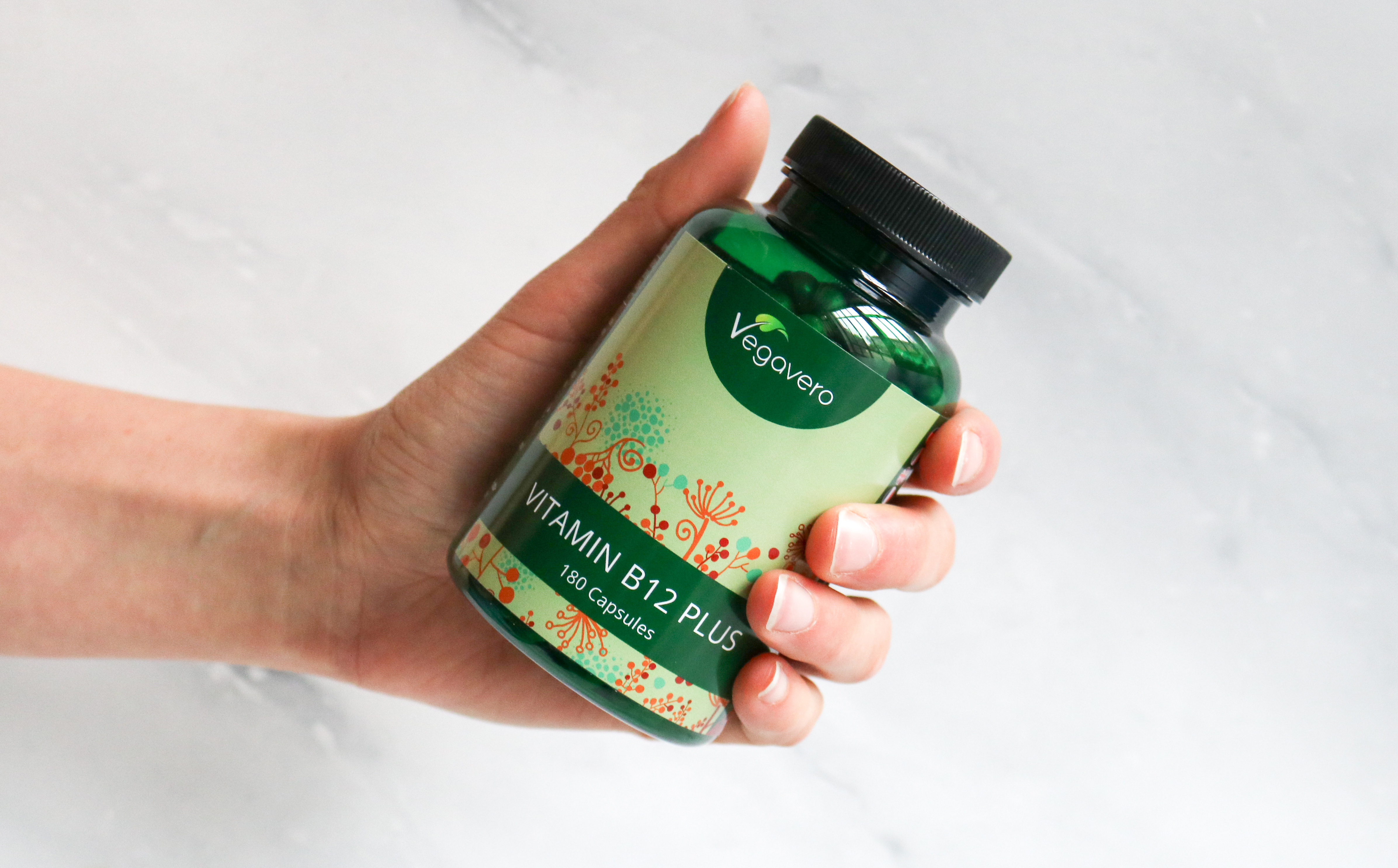
Vitamin B12 is one of the essential vitamins that we need to take in through our food, as our body is not able to synthesise it itself. Nevertheless, it can be stored in the body for several years, which is quite unusual for the group of water-soluble B vitamins.
B12 forms - natural vs. synthetic
What only few people know is that vitamin B12 is not a single substance. It is rather a group of vitamins that includes different forms of B12. Another name for B12 is cobalamin. The name derives from the trace element cobalt, which is found in the core of the vitamin. The four most relevant B12 forms are cyanocobalamin, methylcobalamin, hydroxocobalamin and adenosylcobalamin. They all have the same chemical structure, but are characterized by different side groups, which define their names.
Cyanocobalamin is a synthetic B12 form, which our body can only utilize after conversion into an active form by the liver. Methylcobalamin, hydroxocobalamin and adenosylcobalamin are the naturally occurring forms of cobalamin. However, only methylcobalamin and adenosylcobalamin are active B12 forms that can directly be used by the body. They are therefore characterized by a high bioavailability.

A long way down
Vitamin B12 from food is usually bound to proteins. This B12 protein complex is cleaved in the stomach by certain enzymes found in the gastric juice. Actually, these proteins are only replaced by other proteins - transport proteins that protect B12 from the harsh gastric acid and accompany it to the small intestine.
In the intesine, the protein exchange is repeated until the B12 is finally coupled to the intrinsic factor (IF). This factor ensures that vitamin B12 can be moved to the bloodstream via the intestinal mucosa in the last part of the small intestine, the ileum. From there it is transported to the various body tissues.
Vitamin B12 - Why is it so important?
Vitamin B12 has various functions in our body, with each form of cobalamin having its own individual mission. Depending on the tissue in which B12 is active, it therefore needs to be converted into another form.
Methylcobalamin, the most bioactive form of B12, together with folic acid plays a role in the degradation of the toxic amino acid homocysteine. Elevated levels of homocysteine are harmful and can damage our blood vessels and nerves. The second active form of B12, adenosylcobalamin, is responsible for energy production in the mitochondria, the power plants of our cells.
But vitamin B12 can do much more! Blood formation, nerve function, cell division - B12 has its fingers in all these central biological processes. A B12-deficiency can therefore quickly promote fatigue, exhaustion and immunodeficiency and, in the worst case, cause damage to the nervous system.
Is a B12 supplement necessary?
Vitamin B12 is found in all living beings. Interestingly, however, neither humans, nor plants, nor animals can produce the vitamin. Only the smallest microorganisms, which are also found in our large intestine and the digestive tract of animals, are able to synthesise the vital B12. Unfortunately, the amount of B12 produced by our intestinal bacteria is not sufficient to cover our daily needs.
Vitamin B12 is predominantely stored in the liver and muscle, which is why animal products are generally a good source of B12. Compared to animal derived products, plants contain hardly any relevant amounts of vitamin B12 that can be used by our body. This is mainly due to the fact that the amount of B12-producing bacteria in the soil is no longer as high as it used to be in earlier times.
Contrary to many opinions, even fermented products, including sauerkraut and kimchi, or algae such as chlorella are not reliable sources of the vitamin. For this reason it is necessary for people who follow a plantbased diet supplement with B12. The advantage: B12 from dietary supplements is usually highly dosed and can be easily absorbed by the body, as it is present in an unbound form.
Our B12 Plus
Our vitamin B12 PLUS is very dear to our hearts. A vitamin B12 supplement was the first product we offered as a brand. After a long search we have now found a combination of exceptional raw materials that make our B12 PLUS so special! Apart from B12, the capsules contain folic acid, B6 and choline. For B12 as well as for the other vitamins, we have chosen the active and particularly stable forms: methylcobalamin and adenosylcobalamin, as well as the vitamin B6 form pyridoxal-5-phosphate and the folic acid form 5-methyltetrahydrofolic acid.
We deliberately chose this combination of B-vitamins and choline. Not only does each individual vitamin have a number of positive effects on our body. B12, B6, folic acid and choline also support each other in various metabolic processes.

Prevention is better than cure
B12 is an exceptional vitamin with many central functions for our health. It should therefore not be neglected in our diet. Not only vegans and vegetarians should ensure a sufficient supply through a dietary supplement. It is also recommended that people who consume animal products regularly check their vitamin B12 levels and supplement if necessary to avoid a deficiency.
Sources:
- Reynolds, Vitamin B12, folic acid, and the nervous system. Lancet Neurol. (2006) (https://www.ncbi.nlm.nih.gov/pubmed/17052662)
- Watanabe, Vitamin B12 sources and bioavailability. Exp Biol Med (Maywood). (2007) (https://www.ncbi.nlm.nih.gov/pubmed/17959839)
- Green et al., Vitamin B12 deficiency. Nat Rev Dis Primers. (2017) (https://www.ncbi.nlm.nih.gov/pubmed/28660890)


